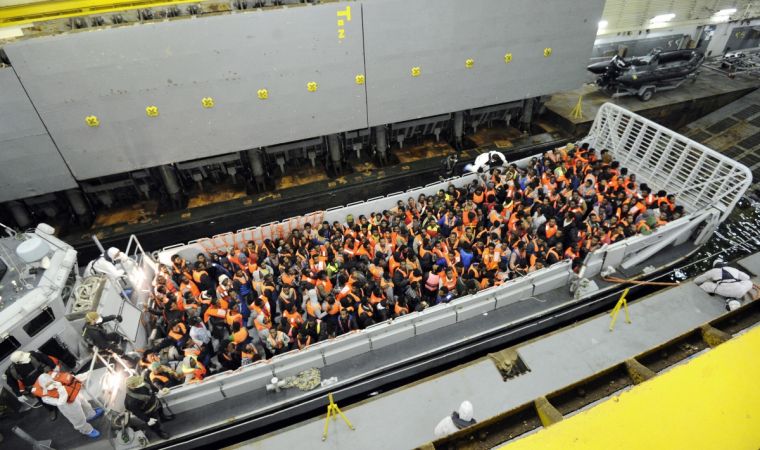Bishop on migrant ships: 'Governments must recognise that others' suffering is our business'

A Catholic bishop has warned the government not to 'pass by the other side' following the UK's refusal to support rescue missions for drowning migrants in the Mediterranean.
This week the Italian navy said it is scaling down its operation to rescue people in the Mediterranean Sea who are trying to escape conflict in the Middle East and Africa. A smaller European operation, Triton, is to take its place, but its budget is smaller. The UK government has said it will not assist, controversially claiming that the rescue mission encourages people to attempt the dangerous journey to cross the sea.
The Italian rescue mission was launched when hundreds of migrants were drowned near the Island of Lampedusa last year. In the past year it has rescued an estimated 150,000 people, though thousands are still thought to have drowned.
Bishop Patrick Lynch, one of the Bishops of the Archdiocese of Southwark, is also chair of the Office for Migration Policy at the Catholic Bishops' Conference Department of International Affairs.
"Last summer at Lampedusa Pope Francis challenged us to take responsibility for our brothers and sisters," said Bishop Lynch in a statement. "He warned us against losing our bearings in a culture of comfort and becoming insensitive to the cries of other people.
"Since the tragedies of last October, the Italian navy has led efforts to save many thousands of lives but now this is a time for all European governments to recognise that others' suffering is our business. While efforts are being made to find lasting solutions to these challenges, we have a duty to heed with compassion the cries of our wounded brothers and sisters, and not to pass by on the other side.
"Britain is still Europe's leading naval power, and to refuse to join in Mediterranean search and rescue operations would be a misguided abdication of responsibility to those thousands of men, women, and children who have been driven from their homes by persecution and war and forced to risk death at sea."
The government's decision to boycott the rescue mission has been strongly criticised by human rights groups. "The British Government seems oblivious to the fact that the world is in the grip of the greatest refugee crisis since the Second World War," said the chief executive of the Refugee Council, Maurice Wren, in a statement. "People fleeing atrocities will not stop coming if we stop throwing them life rings; boarding a rickety boat in Libya will remain a seemingly rational decision if you're running for your life and your country is in flames. The only outcome of withdrawing help will be to witness more people needlessly and shamefully dying on Europe's doorstep.
"The answer isn't to build the walls of fortress Europe higher, it's to provide more safe and legal channels for people to access protection."
Campaign group Human Rights Watch is also fighting proposals by the Spanish government to make it easier to reject asylum seekers from Morocco. "The amendment would formalise an ongoing but unlawful practice of summarily returning migrants and asylum seekers to Morocco even after they have reached Spanish territory," it said in a statement. "In some cases, Spanish Civil Guards have also used excessive force to return people. Automatic returns of this kind violate European law, as well as international human rights and refugee law obligations undertaken by Spain."











